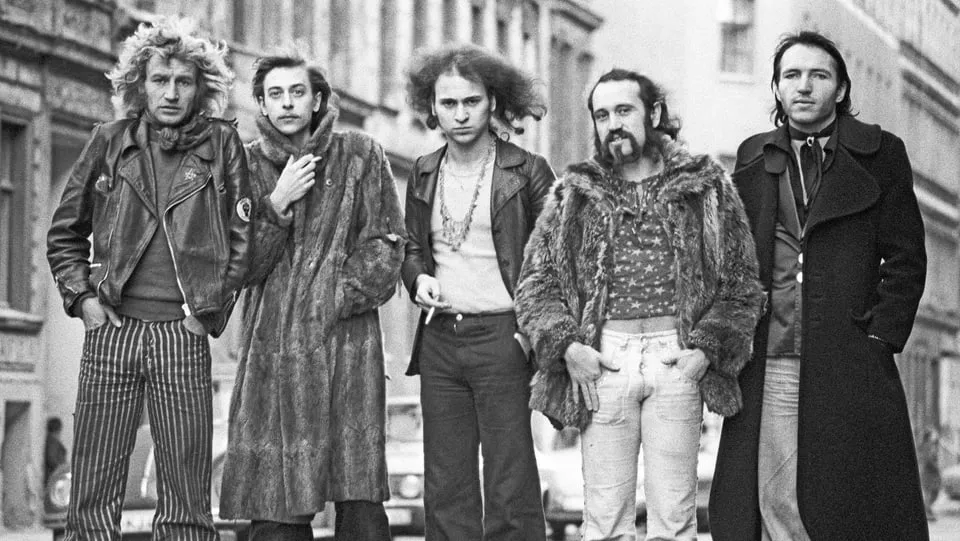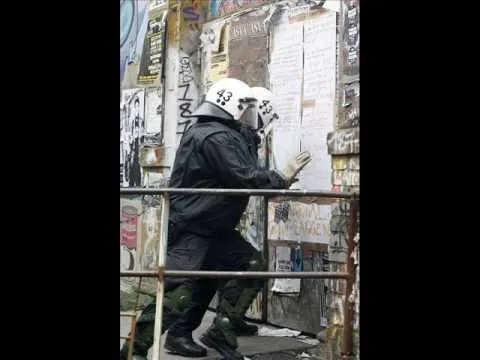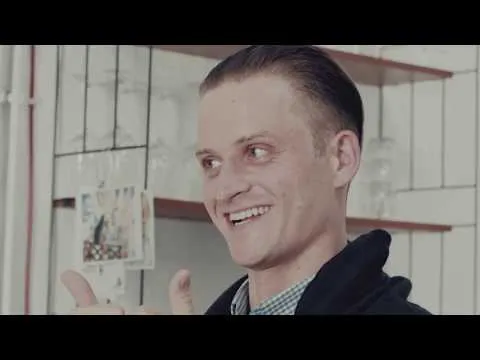Half a century ago (OMG, has it been this long already?) Berlin must have been a completely different place. Not only was the divided city the epicenter of the Cold War, it was also the place where the times that were a-changing carried us over from a repressive and stuck-up culture into an era of common sense reasonability (yeah man). East and West, Young and Old, today it all feels like it was an eternity ago. Curiously, some things remain totally unchanged. And trying to find a room to rent over the last couple of weeks sort of evoked memories of things from before I was even around. One such issue is the Wohnungsnot or housing shortage, something West Berlin used to be notorious for, which apparently still is a defining feature of the current city. Although there is a solution, which the band Ton Steine Scherben discussed in their Rauch-Haus-Song.
Historical Sites of an Acute Problem
During the time I was looking for a room in a shared apartment, I also got to hang out with a friend who showed me around the city, specifically the Kreuzberg district, which had always been known for its vibrant alternative scene. At one point she pointed out the square we were in as the Mariannenplatz, bringing to mind an old song about the beginning of the squatting movement in the 1970's. Being familiar with this classic, my next question was: "So where is the Rauch-Haus?" She pointed across the square: "Over there, right behind the Bethanien." And we even took a stroll past a gorgeous yellow brick building from the mid 19th century. I was totally psyched to see the location of some famous events, that I had only heard of back in my teenage days.
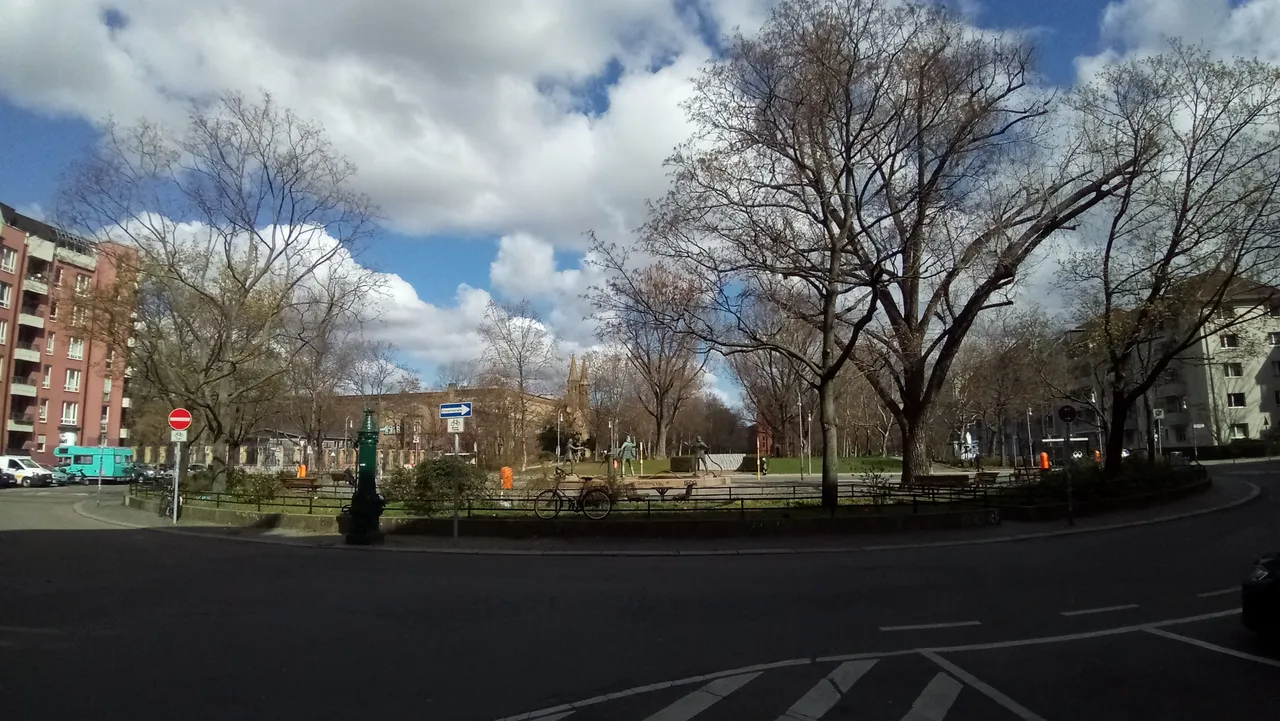
No Place to Live but Lots of Empty Buildings
Back when West Berlin was an island of the capitalist West Germany, surrounded by socialist East Germany, they seemed to have a bit of a space problem. There were simply not enough (affordable) apartments around. What added to this issue on the apparent surface, was an influx of young men who did not want to do their military service, which was obligatory in all of W.Germany, except for Berlin. This meant that all the hippies ended up getting stuck here, particularly in the less expensive district of Kreuzberg. The more serious underlying causes for the housing crisis, however, was the fact that large tracts of the city had been bought up for development, and discontinued to be rented out.
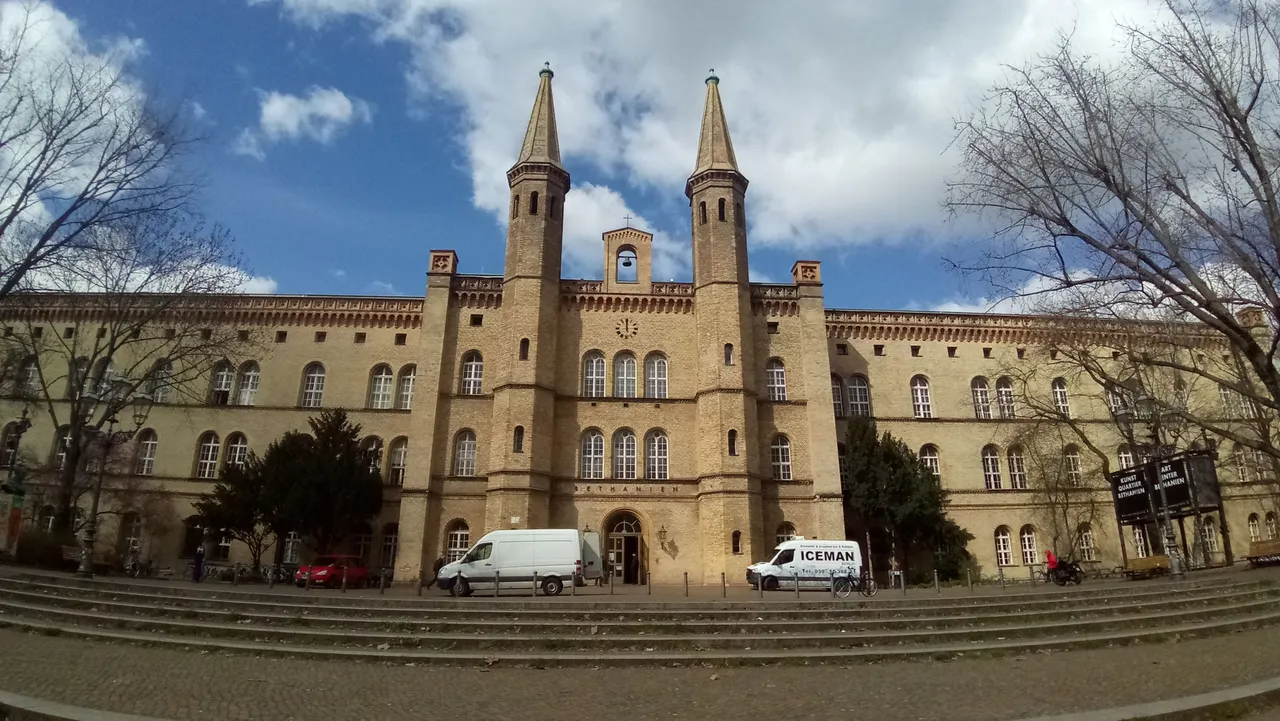
Seeing how impossible it was to find a room to rent, it was understandably frustrating to see large buildings standing empty and unused, such as the Bethanien, a former hospital that had stopped functioning as such long before. So one day, intrepid folks wanting some space to live simply moved in and made themselves at home in the wing that used to be the nurses' living quarters. To honor an anarchist activist, Georg von Rauch, who had been killed by the police only a few days before, the squatters renamed the building after him.
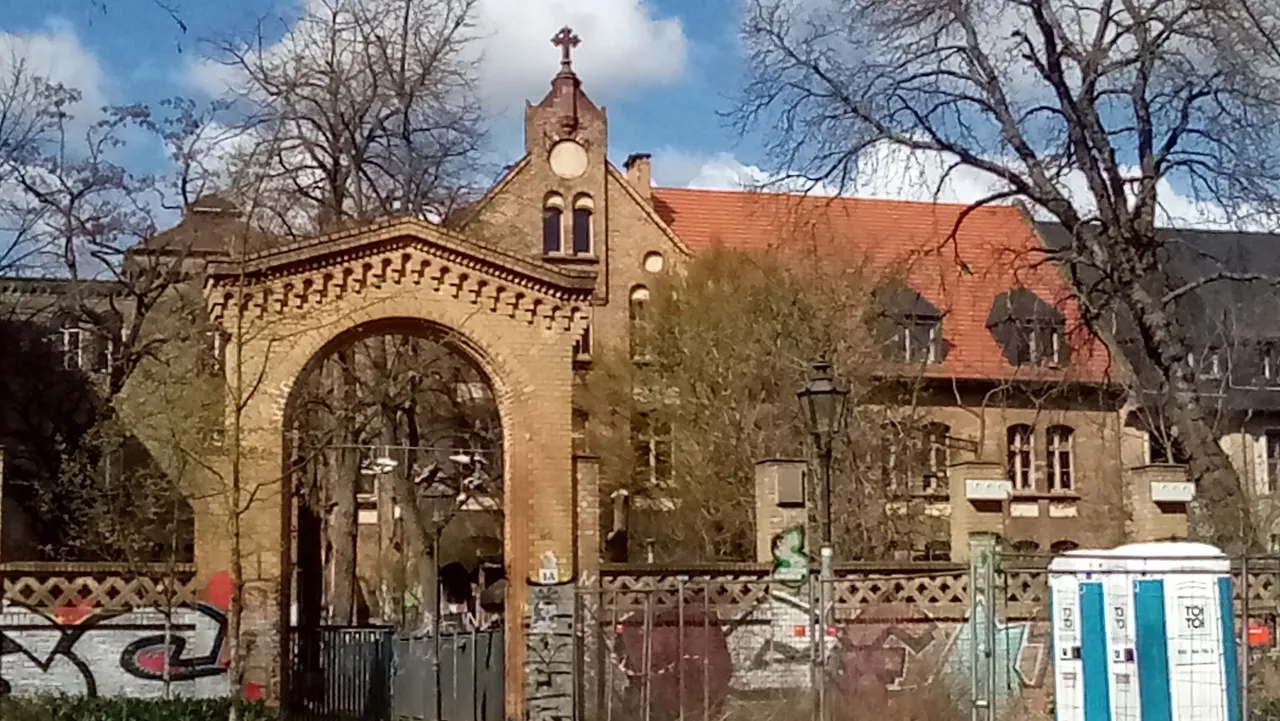
A Music Group of Squatting Activists
The first wave of occupants of the Georg-von-Rauch-Haus consisted of a band who played a concert at the Technical University of Berlin, as well as a good portion of their audience at said concert. Consequently, they later told the story of their occupation and eviction in a song that became the anthem of the German squatting movement. This could be attributed to their defiant chorus, in which they call for the eviction of the biggest real estate developers, Schmidt & Press and Mosch. Over the years it has been chanted from the balconies and windows of numerous occupied buildings all over Germany. Throughout the 70's the band Ton Steine Scherben have brought out eight albums of revolutionary political rock, and just as many tribute compilations in the 21st century.
Lyrics in German and English
| German | English |
|---|---|
| Der Mariannenplatz war blau, soviel Bullen waren da. Und Mensch Meier musste heulen, das war wohl das Tränengas. Und er fragte irgendeinen: „Sag mal, ist hier heut 'n Fest?“ „Sowas ähnliches“, sagte einer, „das Bethanien wird besetzt.“ | The Mariannenplatz was blue, there were so many cops there. And Mensch Meier had to cry, that was probably the tear gas. And he asked someone: "Tell me, is there a party here today?" "Something like that," said someone, "the Bethanien is being occupied." |
| „Wird auch Zeit“, sagte Mensch Meier, „stand ja lange genug leer. Ach, wie schön wär' doch das Leben, gäb' es keine Pollis mehr.“ Doch der Einsatzleiter brüllte: „Räumt den Mariannenplatz, damit meine Knüppelgarde genug Platz zum Knüppeln hat.“ | "It's about time," said Mensch Meier, "it's been empty for long enough. Oh, how beautiful life would be if there were no more cops." But the comander yelled: “Clear Mariannenplatz, so that my nightstick guard has enough space to use their nightsticks." |
| Doch die Leute im besetzten Haus riefen: „Ihr kriegt uns hier nicht raus! Das ist unser Haus, schmeißt doch endlich Schmidt und Press und Mosch aus Kreuzberg raus!“ | But the people in the occupied house shouted: "You can't get us out of here! This is our house! Why don't you rather kick Schmidt and Press and Mosch out of Kreuzberg?” |
| Der Senator war stinksauer, die CDU war schwer empört, dass die Typen sich jetzt nehmen, was ihnen sowieso gehört. Aber um der Welt zu zeigen, wie großzügig sie sind, sagten sie: „Wir räumen später, lassen sie erstmal drin.“ | The senator was pissed off, the CDU was outraged, that these guys are now taking what's theirs anyway. But to show the world how generous they are they said: "We'll evict them later, let them stay for now." |
| Und vier Monate später stand in Springers heißem Blatt: Das Georg-von-Rauch-Haus hat eine Bombenwerkstatt. Und die deutlichen Beweise sind zehn leere Flaschen Wein, und zehn leere Flaschen können schnell zehn Mollies sein. | And four months later you could read in Springer's hot paper: The Georg-von-Rauch-Haus has a bomb workshop. And the clear evidence are ten empty bottles of wine, and ten empty bottles can quickly become ten molotov cocktails. |
| Doch die Leute im Rauch-Haus riefen: „Ihr kriegt uns hier nicht raus! Das ist unser Haus, schmeißt doch endlich Schmidt und Press und Mosch aus Kreuzberg raus!“ | But the people in the Rauch-Haus shouted: "You can't get us out of here! This is our house! Why don't you finally kick Schmidt and Press and Mosch out of Kreuzberg?” |
| Letzten Montag traf Mensch Meier in der U-Bahn seinen Sohn. Der sagte: „Die wollen das Rauch-Haus räumen, ich muss wohl wieder zu Hause wohn'.“ „Is' ja irre“, sagte Mensch Meier „sind wa wieder einer mehr in uns'rer Zwei-Zimmer-Luxuswohnung und das Bethanien steht wieder leer." | Last Monday, Mensch Meier met his son on the metro. He said: "They want to clear the Rauch-Haus, seems like I'll have to live at home again." "It's crazy," says Mensch Meier, "then we'll be again one person more in our two-room luxury apartment and the Bethanien is empty again." |
| "Sag mir eins, ha'm die da oben Stroh oder Scheiße in ihrem Kopf? Die wohnen in den schärfsten Villen, unsereins im letzten Loch. Wenn die das Rauch-Haus wirklich räumen, bin ich aber mit dabei, und hau' den ersten Bullen, die da auftauchen ihre Köppe ein.“ | "Tell me one thing, do they have straw or shit in their heads up there? They live in the smartest villas, the likes of us in the last hole. If they really clear the Rauch-Haus you bet I'll be there too, and I'll smash in the heads of the first cops that show up." |
| Und ich schrei' es laut: „Ihr kriegt uns hier nicht raus! Das ist unser Haus, schmeißt doch erstmal Schmidt und Press und Mosch aus Kreuzberg raus!“ | And I shout it out loud: "You can't get us out of here! This is our house! Why don't you first kick Schmidt and Press and Mosch out of Kreuzberg?” |
| Und wir schreien's laut: „Ihr kriegt uns hier nicht raus! Das ist unser Haus, schmeißt doch endlich Schmidt und Press und Mosch aus Kreuzberg raus!“ | And we shout it loud: "You can't get us out of here! This is our house! Why don't you finally kick Schmidt and Press and Mosch out of Kreuzberg?” |
A Recent Remix About a Contemporary Problem
Fast-forward to fifty years later, and the same housing issue has taken on a different shade. Out of all the cover versions and remixes of the Rauch-Haus-Song my favorite one is by the crossover band KAFVKA, in which they highlight the issue that befalls many (formerly) alternative neighborhoods worldwide, and Kreuzberg is no exception: Gentrification. In their new and up-to-date lyrics KAFVKA point out how "they're living in my old pad, while the likes of us in the outskirts and why don't you kick anyone without cash out of Kreuzberg? I could not identify more with this, as the room in the shared place I found actually happens to be on the edge of Berlin.
In the end though, I am quite happy to have found a place to live, along with awesome people in Berlin who I'm on the same wavelength with, even though it takes a good amount of travel time to see them. A great THANK YOU goes out to my aforementioned friend, who introduced me to many of them at her party, which I really enjoyed last night. 😉

This post is part of my Monday Music series, which you're welcome to visit and get an idea of my eclectic taste of tunes. And yes, I know, today is...! But it's gotta be Monday somewhere in this world, right?
